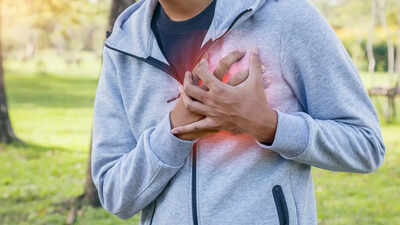In recent years, gyms have become more than just places to build muscle; they’ve become potential hotspots for sudden cardiac events. With heart attacks during workouts making headlines more frequently, doctors are urging fitness enthusiasts to take precautionary health screenings seriously, especially before beginning or intensifying a workout routine.
Why Heart Attacks Happen During Exercise
Heavy and strenuous workouts can cause a sharp spike in blood pressure if not approached gradually and correctly.Increased blood pressure during a tough gym session is natural, but if someone already has a weak heart or blocked arteries, this spike can be dangerous.Undiagnosed conditions like coronary artery disease, arrhythmias, or hypertrophic cardiomyopathy often go unnoticed until triggered by physical exertion.Lifestyle habits such as smoking, poor diet, or unmanaged diabetes compound the risk, even in younger individuals

What the doctor says
Dr. Obaidur Rahman, an Orthopedic and Sports Surgeon (MS, RML), recently shared a tragic case that underscores the importance of preventive screening. One morning, a man collapsed on a treadmill after a regular cardio session. By the time he reached the emergency room, his heart had already stopped twice. Despite all efforts, he couldn’t be revived.Postmortem findings revealed he had Hypertrophic Cardiomyopathy (HCM), a condition where the heart muscle becomes abnormally thick, making it harder for the heart to pump blood. It’s a silent condition that can be easily detected through a simple scan, and if caught early, lives can be saved.
5 essential tests for gym-goers
If you’re over 30, have a family history of heart disease, or are beginning a new fitness regime, these tests are not optional; they are critical.

ECG (Electrocardiogram)
A basic but powerful test, the ECG records the heart’s electrical signals. It can detect abnormalities like arrhythmias and help predict the risk of sudden heart failure. It’s painless, quick, and a good baseline test for anyone starting workouts.
2D Echo (Echocardiography)
This ultrasound scan provides live images of the heart, assessing its structure and function. It helps spot conditions like HCM, valve disorders, and other heart defects that might otherwise go unnoticed.
TMT (Treadmill Test or Stress Test)
This test evaluates how your heart performs under physical stress. You’ll be asked to walk or run on a treadmill while your heart activity is monitored. It’s especially useful in revealing blocked arteries or poor blood flow that only shows up during exertion.
Troponin and NT-proBNP
These blood tests check for early signs of cardiac strain or injury. Elevated levels could indicate silent heart damage or stress that may not yet be showing symptoms.
hs-CRP and ESR(Erythrocyte Sedimentation Rate)
Inflammation plays a key role in cardiovascular disease. While ESR measures general inflammation, hs-CRP is more specific to heart-related inflammation. High readings could signal higher risk for heart issues in the future.

Lipid Profile + HbA1c
These tests check cholesterol and long-term blood sugar levels. Elevated cholesterol and uncontrolled diabetes are two major contributors to heart disease and stroke. Early detection allows for dietary and medical intervention.
“These tests are not a luxury.”
Many people assume these are “extra” or advanced screenings meant only for the elderly or elite athletes. But as Dr. Rahman stresses, “These are life-saving tests. Especially if you’re over 30, push yourself hard in the gym, or have a family history—please, get checked first.”



